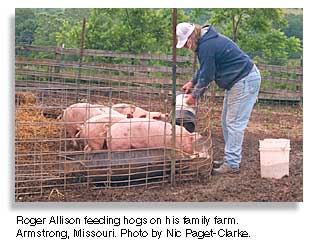|
These livestock factories are industry and create industrial-size waste,
yet they hide behind family farmers to avoid regulations is inherently flawed There is a better way -- independent family farmers Roger Allison Des Moines, Iowa
My name is Roger Allison. I'm a livestock and grain farmer from Howard County, Missouri and the Executive Director of the Missouri Rural Crisis Center, a statewide farm and rural organization representing 4000 families. I'm also here today representing the Campaign for Family Farms and the Environment, a coalition of farm organizations fighting factory farms in eight states. The AFO (Animal Feeding Operations) Strategy being promoted today represents just another piece of evidence that the EPA and the USDA are being outsmarted, outmaneuvered and out-muscled by Big Ag! This exercise began as a result of the environmental devastation caused by factory farms in 1995 when spills from factory farms dumped millions of gallons of manure into the lakes, rivers and streams of this nation. During a 3-week period of time alone in Missouri, two corporate hog factories created more environmental degradations in the form of fish kills and dead streams than was created by all of agriculture in the previous decade. This pollution has increased and gone unabated. Now EPA trots this masterpiece of voluntary compliance which only blurs the line between the real polluters and independent family farmers. This is nonsense -- the problem is factory farms and we need a program targeted to ensure that they are toughly regulated under "industry standards" which is exactly what they are. Given their propensity to destroy not only the environment but local economies by replacing family farmers who reinvest in their own communities with livestock producing factories who don't give a damn about rural communities, family farmers or the environment. This AFO strategy assumes that factory farms are inevitable, potentially sustainable and are virtually the same as family farms. The reality is that this corporate-controlled factory system is inherently flawed. These livestock factories are industry and create industrial-size waste, yet they hide behind family farmers to avoid regulations and from the looks of this AFO strategy continue to be very successful at it. Hog factory proponents say that regulation of these corporate polluters will hurt the livestock industry. Since 1986, we've lost 60% of the hog farmers in the U.S. It's not regulation that's running hog farmers out of business, it's lack of regulation that allows corporations to control entire sectors of agriculture at the expense of family farmers, rural communities and the environment. This corporatization of livestock isn't about profitability of the industry, it's about profitability of a few corporations. It's about corporate greed and control of the market. There is a better way -- independent family farmers.
If the EPA and USDA were to seriously consider the sustainability of the livestock industry, this type of concentrated corporate-controlled production would be banned. The horror stories released yesterday by NRDC and the Cleanwater Network in the publication "America's Animal Factories" weren't created by the actions of independent family farmers -- they were created by industrial-size livestock factories who have gone virtually unregulated. EPA and USDA must focus on regulating the real polluters -- cafo's (Concentrated Animal Feeding Operations). They must target operations with 1,000 animal units or more and the corporations who own 1,000 animal units or more on multiple sites. Until this happens, we need a moratorium on these factories. Also read:
|
| Published in In Motion Magazine January 27, 1999. |
If you have any thoughts on this or would like to contribute to an ongoing discussion in the  What is New? || Affirmative Action || Art Changes || Autonomy: Chiapas - California || Community Images || Education Rights || E-mail, Opinions and Discussion || En español || Essays from Ireland || Global Eyes || Healthcare || Human Rights/Civil Rights || Piri Thomas || Photo of the Week || QA: Interviews || Region || Rural America || Search || Donate || To be notified of new articles || Survey || In Motion Magazine's Store || In Motion Magazine Staff || In Unity Book of Photos || Links Around The World NPC Productions Copyright © 1995-2020 NPC Productions as a compilation. All Rights Reserved. |


 The following speech by Roger Allison, executive director of the Missouri Rural Crisis Center, was delivered as testimony at the U.S. Department of Agriculture (USDA) / Environmental Protection Agency (EPA) AFO (Animal Feeding Operations) Strategy listening session on behalf of the Missouri Rural Crisis Center and the Campaign for Family Farms and the Environment. (December, 1998.)
The following speech by Roger Allison, executive director of the Missouri Rural Crisis Center, was delivered as testimony at the U.S. Department of Agriculture (USDA) / Environmental Protection Agency (EPA) AFO (Animal Feeding Operations) Strategy listening session on behalf of the Missouri Rural Crisis Center and the Campaign for Family Farms and the Environment. (December, 1998.)